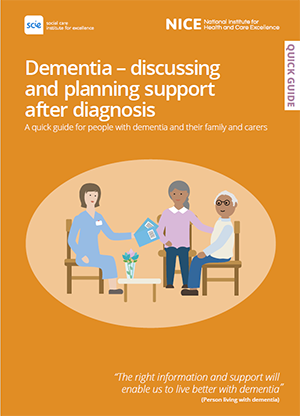Referral to dementia specialist diagnostic services ensure that diagnosis is timely and accurate. Types of dementia can be identified which enables people to access tailored support and treatment sooner.
Timely diagnosis helps the person and their family and carers to know what to expect so that they can consider future mental capacity and make plans early. Referral, diagnosis and advance care planning are included in our guideline on dementia and our dementia quality standard.
Referral for suspected dementia
To ensure an accurate diagnosis, we recommend that a person with suspected dementia should be referred to a specialist dementia diagnostic service. Between April 2018 and April 2019 NHS Digital data shows an increase in the number of GP assessments for dementia, GP initial memory assessments and referrals to a memory clinic from GP practices.
In hospitals, most people aged 75 and over with suspected dementia receive an assessment and go on to have specialist referral where required. Ninety-two per cent of emergency admissions to hospital, in people over the age of 75, were assessed for dementia in April 2019. For people who had a result indicating dementia or with inconclusive results, 94% were referred to specialist services.
More people are receiving a dementia diagnosis
Due to increased referral rates, as well as improved dementia awareness, more people with dementia receive a formal diagnosis. Having a formal diagnosis enables care needs to be assessed, appropriate treatment to be delivered and planning for the future to begin.
A large study by Donegan et al shows the number of people who were diagnosed with dementia in the UK doubled from 0.4% of the GP population in 2005 to 0.8% in 2015. More recently the number of people on the Quality and Outcomes Framework (QOF) dementia register has continued to increase each year.
The number of people recorded with a diagnosis of dementia on GP registers has increased between 2014 and 2019
However, not everyone with dementia has a formal diagnosis. In March 2019, NHS Digital estimated that two thirds (68.7%) of people aged 65 or older with dementia have a formal diagnosis. While this meets one of the ambitions set out in the challenge on dementia and the government’s mandate to NHS England, a third of people living with dementia do not have a diagnosis.
There is variation in the estimated diagnosis rate for people aged 65 or older. In October 2019, the estimated diagnosis rate ranged from 51% to 92% across CCGs. Higher diagnosis rates may be due to some areas prioritising dementia diagnosis and increased awareness of the importance of making a timely diagnosis.
My GP and the psychiatrist were very informative and very straightforward, and my experience was that I accepted that dementia will not define me.
We work with a community of medicines and prescribing associates to support and promote high quality, safe, cost-effective prescribing and medicines optimisation in their local health economies.
The associate from North Cumbria CCG shared the work undertaken by local GP practices as part of the Quality Improvement Scheme focusing on improving the identification, accuracy of records in relation to diagnosis and the ongoing review of people with dementia.
Local discussion and collaboration between GPs and specialists resolved ambiguity in relation to diagnostic terminology used in correspondence between clinicians. This resulted in consensus and an agreement for a consistent approach to appropriate Alzheimer’s disease coding on GP practice systems. The dementia diagnosis rate in North Cumbria increased from 63.6% in April 2018 to 67.7% by March 2019, an increase of 266 patients.
Support after diagnosis
A diagnosis of dementia may create very mixed emotions and coming to terms with it, making decisions and planning ahead are all part of living well with dementia. Getting information and support when needed from people working in health and social care can make a real difference. Our social care quick guide on dementia – discussing and planning support after diagnosis helps people to make decisions and plan ahead.
Our quality standard on dementia states that people with dementia should be given the opportunity to discuss advance care planning at diagnosis and at each health and social care review.
Primary care GP data shows that, in 2018/19, 78% of people diagnosed with dementia had a face-to-face care plan review in the preceding 12 months. Around 1 in 5 people don’t have their condition reviewed, and don’t have the opportunity to make changes to the care or treatment they receive.
